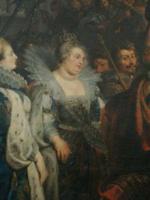Disable ads!
Marguerite de Valois
Margaret of France Detail of painting by Pieter Paul Rubens Queen consort of France and of Navarre Tenure 1589–1599 Spouse Henry IV of France House House of Valois Father Henry II of France Mother Catherine de' Medici Born (1553-05-14)14 May 1553 Château de Saint-Germain-en-Laye Died 27 March 1615(1615-03-27) (aged 61) Hostel de la Reyne Margueritte, Paris Burial Basilica of St Denis Religion Roman Catholicism Margaret of France (French: Marguerite, 14 May 1553 – 27 March 1615) was Queen of France and of Navarre during the late sixteenth century. A royal princess of France by birth, she was the last of the House of Valois. She was the daughter of King Henry II of France and Catherine de' Medici and the sister of Kings Francis II, Charles IX and Henry III and of Queen Elizabeth of Spain. She was queen twice for she had married King Henry III of Navarre who finally became King Henry IV of France. Margaret, among other political manipulations, was subjected to an arranged marriage and being held prisoner (albeit at a castle) for many years. However, her life was anything but passive. Aside from being twice a queen—first of Navarre (1572), then of France (1589), Margaret was famous for her beauty and sense of style (she was one of the most fashionable women of her time, influencing most of Europe's Royal Courts with her clothing). She was also a gifted poet and writer, notable for both her own scandalous behavior and for revealing that of others. Margaret took many lovers both during her marriage and after her annulment. The most well-known were Joseph Boniface de La Môle, Jacques de Harlay, Seigneur de Champvallon and Louis de Bussy d'Amboise. When imprisoned by her brother Henry III for eighteen years, she took advantage of the time to write her memoirs, which included a succession of stories relating to the disputes of her brothers Charles IX and Henry III with her husband Henry IV. The memoirs were published posthumously in 1628. Her life has inspired a variety of stories over the centuries, beginning with Shakespeare's early comedy Love's Labour's Lost written during her lifetime, to Alexandre Dumas, père's 1845 novel La Reine Margot; to a 1994 movie La Reine Margot.
 Read more on wikipedia.org Read more on wikipedia.org
 All quotes by Marguerite de Valois All quotes by Marguerite de Valois
 Edit Edit
|

|
|
|
|
|
Background photo by Giuliana
|